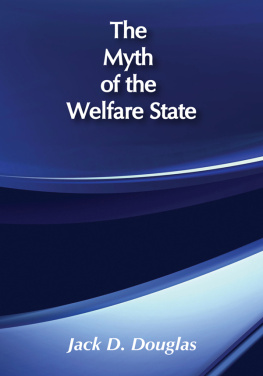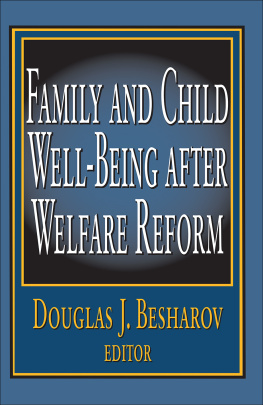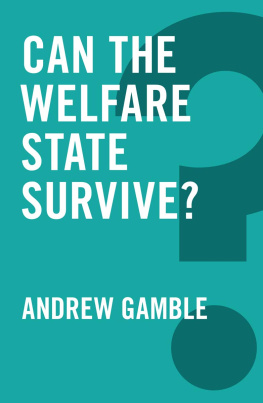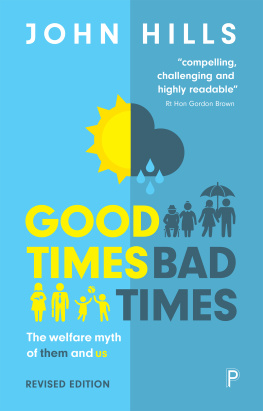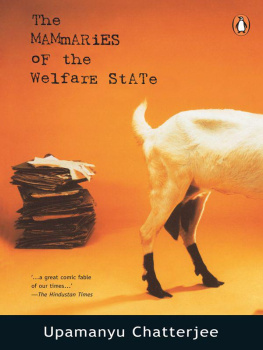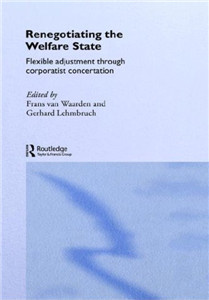THE MYTH OF THE
WELFARE STATE
THE MYTH OF THE WELFARE STATE
Jack D. Douglas
First published 1989 by Transaction Publishers
Published 2017 by Routledge
2 Park Square, Milton Park, Abingdon, Oxon OX14 4RN
711 Third Avenue, New York, NY 10017, USA
Routledge is an imprint of the Taylor & Francis Group, an informa business
Copyright 1989 by Taylor & Francis
All rights reserved. No part of this book may be reprinted or reproduced or utilised in any form or by any electronic, mechanical, or other means, now known or hereafter invented, including photocopying and recording, or in any information storage or retrieval system, without permission in writing from the publishers.
Notice:
Product or corporate names may be trademarks or registered trademarks, and are used only for identification and explanation without intent to infringe.
Library of Congress Catalog Number: 88-16861
Library of Congress Cataloging-in-Publication Data
Douglas, Jack D.
The myth of the welfare state.
Includes index.
1. Individualism. 2. Liberty. 3. Collectivism. 4. Welfare state. I. Title.
JC571.D76 1988320.512--dc19 88-16861
ISBN 0-88738-246-0
ISBN 13: 978-0-88738-874-3 (pbk)
CONTENTS
Modem man is lost in the mass in a way which is without precedent in history. In a thousand different ways mankind has been persuaded to give up its natural relations with reality and to seek its welfare in the magic formulas of some kind of economic and social witchcraft, by which the possibility of freeing itself from the economic and social misery is only still further removed. And the tragic meaning of these magic formulas, to whatever kind of economic and social witchcraft they may belong, is always just this, that the individual must give up his own material and spiritual personality and must live only as one of the spiritually restless and materialistic multitude which claims control over him. The great conflict of our times is personality versus collectivism. In our times the spirit of Hegal and the spirit of Goethe are fighting everywhere. Collectivism in its various forms has deprived the individual of his individuality. All the troubles of the world come from this. The task immediately before us is to safeguard the integrity of the individual within the modem state. I have great confidence in the individual forces of the spirit. The future depends on them. If these spiritual forces are brought into play, the worlds future will be improved The final decision as to what the future of a society shall be depends not on how near its organization is to perfection, but on the degree of worthiness in its individual members.
Albert Schweitzer
It is beyond the power of philosophy to destroy the political myths. A myth is in a sense invulnerable. It is impervious to rational arguments; it cannot be refuted by syllogisms. But philosophy can do us another important service. It can make us understand the adversary. In order to fight an enemy you must know him. That is one of the first principles of a sound strategy. To know him means not only to know his defects and weaknesses; it means to know his strength. All of us have been liable to underrate this strength. When we first heard of the political myths we found them so absurd and incongruous, so fantastic and ludicrous that we could hardly be prevailed upon to take them seriously. By now it has become clear to all of us that this was a great mistake. We should not commit the same error a second time. We should carefully study the origins, the structure, the methods, and the technique of the political myths. We should see the adversary face to face in order to know how to combat him.
Ernst Cassirer
I have planned to write a book explaining the great tidal drifts of imperial state powers since my high school years, when I discovered the scholarly joys of reading Pitirim Sorokin, Arnold Toynbee, Joseph Spengler, and so many other exciting explorers of these awesome mysteries of human life. Though I came eventually to see some fundamental flaws in their macro-perspective on human life, and have had to take very different approaches to explain the great tidal drifts of the waxings and wanings of statist powers, this work began with them and is still grounded in many of their brilliant insights.
They were crucial in my decision as a freshman at Harvard to avoid all the professional careerism and blinders that have long afflicted social scientists and humanists. I set out to study human beings from all perspectives that offered any hope of throwing light upon the great mysteries that envelop us in darkness (if I may indulge in an emanationist point of enlightenmentsee ). I obviously had to choose a profession to get one of the Ph. D. licenses prerequisite in our bureaucratized world to an academic job that would allow me the leisure to pursue this quest. I chose sociology, the official moniker of Pitirim Sorokin, who had just been forced into emeritus exile at Harvard, because it seemed to bridge the ever-widening cultural gaps between commonsense wisdom, the other social sciences, and the humanities better than any of the other professions. Though the sociological imagination has been starved and greatly distorted in recent decades by the government-financed and -regulated academic bureaucracies of scientism, this decision was probably wise. We still manage to live and find leisure enough for such works as this in the many niches not yet completely controlled by the bureaucrats.
Most of my published work for the past twenty years has been concerned with the fundamental problems of discovering the truth about the details of everyday life and then explaining them. As I explained in Investigative Social Research many years ago, I had come to realize with a shock that most of the work in the social sciences was built on misinformation and disinformation, including the carefully constructed theodicies and propaganda of some statist bureaucratic information. Though their commonsense wisdom and clear-eyed scholarship, unblinded by professional blinkers, saved Sorokin and the other theorists of cultural drift from most of these pitfalls and snares, they did not realize how fundamental the problems were. It will be obvious to anyone who knows about these great epistemological issues in the social sciences, and knows my own earlier works on those, that this work is built firmly on the foundations of the so called everyday life perspective. That is, it begins with the raw realities of individuals doing real things in real life, undistorted by bureaucratic or academic preconceptions, and builds upward to more general ideas. I obviously owe an immense amount to all of the many people who have toiled with me over the decades in the trenches of everyday lifeuncovering, preserving, honing, grasping, understanding and explaining the raw facts of all human life.
I began this work over ten years ago while on a sabbatical from the University of California and a fellowship from the Guggenheim Foundation which provided the leisure to study British socialism firsthand, down in the labyrinthine coils of one of the socialist megastates that bureaucratizes life even more than our American megastate. I have given early drafts of pieces of this work at conferences sponsored by many foundations and academic groups. This has allowed me to present the facts and ideas to small groups of hundreds of scholars and scientists from all the major disciplines. This work was truly forged in the fiery crucibles of intellectual teamwork and combat. Though I cannot name all the individuals who have helped so much, I owe special thanks to the Liberty Fund, the Institute for Humane Studies, the Reason Foundation, the Center for Libertarian Studies, and, very recently, the Rockford Foundation.


